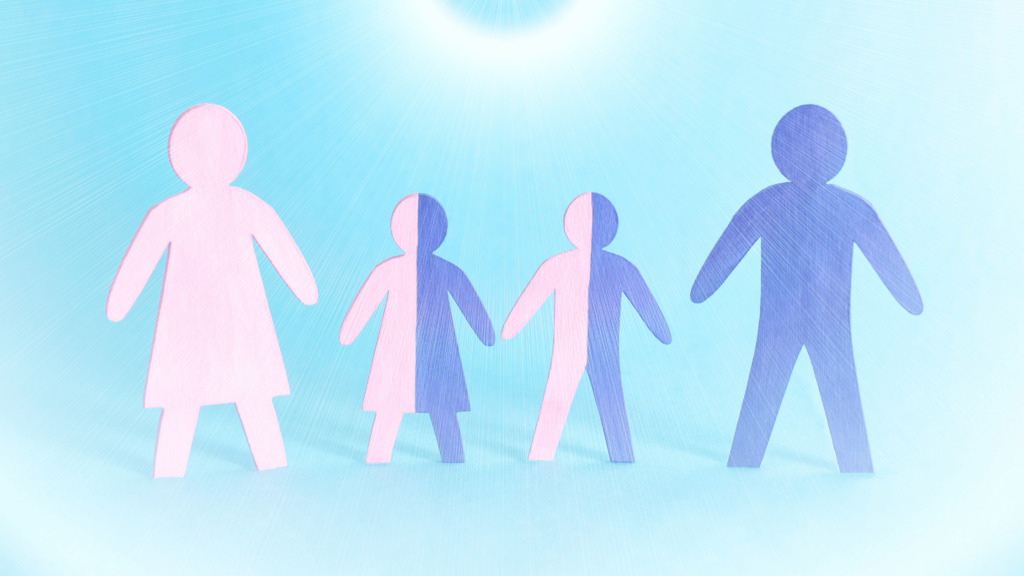If you or someone you love is struggling with depression, you may find yourself wondering why some people develop this condition while others do not. It’s natural to seek answers, and one of the most common questions is: Is depression genetic?
Depression is a complex and deeply personal experience, affecting not only those who live with it but also their loved ones. It can be overwhelming and confusing, leaving family members searching for explanations—especially about what causes it.
In this discussion, we’ll explore the role of genetics and biological factors in depression. How much of our mental health is shaped by our DNA? And how do environmental influences interact with our genetic makeup? By understanding the connection between genetics and depression, we can gain deeper insight into the various risk factors that contribute to this condition.
Understanding Depression: Symptoms and Impact
Depression is more than just feeling sad or going through a rough patch. It’s a serious mental health condition that affects how you feel, think, and handle daily activities. Major depression, formally known as major depressive disorder, really affects how someone manages their daily activities. It’s important to understand this challenge and support those who are experiencing it.
Depression manifests differently in everyone, but some common depressive symptoms to watch for include the following:
- Persistent sadness: Feeling an overwhelming sense of hopelessness that doesn’t seem to lift, even on good days.
- Loss of interest: Activities that once brought joy, like hobbies or spending time with loved ones, now feel empty.
- Changes in appetite: A big increase or decrease in appetite, sometimes causing weight changes.
- Difficulty sleeping: Trouble falling asleep, waking up often, or oversleeping, yet still feeling tired.
It’s important to recognize that depression isn’t just a state of mind. It also has serious physical consequences. Prolonged depression leads to a weakened immune system, chronic pain, and a higher risk of other medical conditions. This shows how important it is to seek depression treatment early and to build a caring environment for those affected. Together, we can make a positive impact and support each other.
Is Depression Hereditary? Exploring the Genetic Link
Research shows that depression often runs in families, which may point to a genetic connection to psychiatric disorder. This means that some genetic variants might make it more likely for someone to experience depression. For instance, researchers have found several genetic markers that may raise the risk of depression. However, it’s important to note that no single “depression gene” has been identified.
- According to the National Institutes of Health (NIH), genetics significantly influence depression. Approximately 40% to 50% of the risk being inherited. Family and twin studies show first-degree relatives are two to three times more likely to develop the condition. This shows a strong genetic link. However, identifying specific genes is challenging due to the disorder’s complexity.
- Stanford researchers say multiple genes influence depression, not a “depression gene.” Each gene has a small effect.” This shows that genetics is just one piece of the puzzle. Environmental and personal factors also play their roles.
Understanding your family history of mental health is the first step in understanding your genetic depression risk factors. It’s good to remember that a genetic predisposition to depression doesn’t guarantee it. Each person’s journey is unique. Your genetics, along with your experiences—like stress, trauma, or personal challenges—play a big role in shaping your mental health. Everyone’s situation is different and will lead to different outcomes.
Environmental Influences: Beyond Genetics
Feeling down? Your genes aren’t destiny. A loving family and supportive friends can work wonders on someone’s depressed mood. These positive influences shield against inherited risks, nurturing mental well-being. A caring environment can, despite genetics, help fend off depression. Adverse life events, like sexual abuse or neglect, can trigger depression. This is especially true for those with a genetic vulnerability.
Several factors affect the risk of developing depression, including socioeconomic status, access to healthcare, and cultural background. Here’s how these and other factors can play a role:
- Socioeconomic Status: People in poverty may face stress from financial instability. This makes them more vulnerable to depression. For example, struggling to afford basic necessities can lead to chronic anxiety and despair.
- Healthcare Access: Limited access to mental health services prevents early intervention. This worsens symptoms. For instance, someone without insurance might delay seeking help, allowing depression to worsen.
- Cultural Background: Cultural stigma around mental health discourages individuals from seeking support. In some communities, it’s taboo to discuss mental health. This leads to untreated depression.
By understanding these influences, we can work together to create supportive environments that help everyone thrive.
The Interplay of Genes and Environment on Depression
Consider two individuals with a genetic predisposition to develop major depression. The first person lives in a stable environment with strong social support and healthy coping mechanisms. They may never develop depression despite their genetic risk. The second person, however, faces many stressful life events, such as the loss of a job or a relationship breakdown. These external pressures might trigger depression. It shows how the environment might activate genetic vulnerabilities.
Approaches to Treatment: Therapy and Beyond
No matter your family history of depression, therapy helps you manage your feelings and improve your life. It provides a welcoming space where you’ll talk about your emotions, learn helpful ways to cope, and get support that fits your unique needs.
There are various therapeutic approaches available, each offering unique benefits:
- Identifying Family History of Depression: Your family’s mental health history may reveal patterns that affect you.
- Psychodynamic Psychotherapy: This approach looks at the unconscious and past personal experiences. It helps you overcome deep emotional issues.
- Inner Child Healing: Focusing on nurturing and healing the emotional wounds of your inner child.
- Mindfulness & Meditation: They can help you stay grounded and manage stress better.
- Self-Affirmation & Embracing Feelings: Learn to identify and embrace your feelings. Also, practice self-affirmation. This can boost your self-esteem and reduce negative thoughts.
- Holistic Approaches: Help to manage depression. They include lifestyle changes, like regular exercise, a healthy diet, and mindfulness practices. Work with a healthcare provider. Develop a plan to improve your well-being.
At Susan Hollander, Ph.D., we offer these personalized treatments to support your journey toward mental well-being. Read more about what to expect.
Supporting Loved Ones with Depression
If someone you care about is feeling down, it can be hard to find the right way to help. Your support can really make a difference. It’s important to show kindness and understanding as you reach out to them. Here’s how you can support someone who is feeling depressed:
- Encourage Open Communication: Let them know you’re there to listen without judgment. For example, you might say, “I’m here for you if you ever want to talk.”
- Suggest Professional Help: Gently encourage them to seek therapy and offer to help find a therapist or go with them to appointments. For instance, you could ask, “Would you like me to help you look for a therapist?”
- Take Care of Yourself: Ensure you have your own support system. If supporting them feels overwhelming, consider seeking counseling for yourself. For example, you might join a support group or talk to a therapist.
Conclusion: Taking Steps Toward Healing
While the connection between gene variants and depression is complex, one thing is clear: you are not alone. Understanding that different genes contribute to depression will empower you to take steps toward healing. Whether through therapy, lifestyle changes, or the support of loved ones, there are many paths to recovery.
At Susan Hollander, Ph.D., we’re here to help you navigate this journey with compassion and care. If you have concerns about depression, whether for yourself or a loved one, please don’t hesitate to reach out. Please schedule a consultation to discuss your mental health. You can also explore our website to learn what to expect. We’re here to listen and provide the support you need.
Can depression be passed down from parents to children?
Yes, depression can have a hereditary component. Genetic factors play a significant role in the likelihood of developing depression. If a close family member, such as a parent or sibling, has experienced depression, the risk of developing it increases.
Are there specific types of depression that are more likely to be hereditary?
Certain types of depression, like recurrent depression, tend to have a stronger hereditary link. Bipolar disorder also has a significant genetic component, meaning it can be passed down within families.
Does having a family history of depression guarantee that I will develop it?
No, having a family history of depression increases the risk but does not guarantee that you will develop it. Other genetic factors and environmental influences also play crucial roles.
What about other mental health conditions? Are they hereditary too?
Yes, other mental health conditions, such as anxiety disorders and generalized anxiety disorder, can also have hereditary components. Like depression, genetic factors contribute to the risk, but they are not the only determinants.
Can I do anything to reduce my risk if depression runs in my family?
While you can’t change your genetic factors, maintaining a healthy lifestyle, managing stress, and seeking help if you experience symptoms can help reduce your risk. It’s also important to stay informed about your family’s history with mental health conditions.
If my parent has bipolar disorder, does that mean I will get it too?
Not necessarily. While bipolar disorder does have a strong genetic link, many people with a family history of bipolar disorder do not develop it. However, it’s important to be aware of the symptoms and seek professional help if needed.
What should I do if I’m worried about the hereditary risk of depression?
If you’re concerned about the hereditary risk of depression or other mental health conditions, consider speaking with a mental health professional. They can help assess your risk and provide strategies to manage or reduce the likelihood of developing depression or anxiety disorders.
What is Depression Treatment?
Therapists may use different techniques to help individuals with depression. These include Cognitive Behavioral Therapy (CBT), mindfulness, and other evidence-based methods.
How Do I Know if I Need Depression Therapy?
If depression is getting in the way of your daily routine, relationships, or overall happiness, it might be a good idea to explore therapy. Watch for signs. These include constant sadness, loss of interest, fatigue, trouble focusing, sleep problems, weight gain or loss, thinking of ending your life.
What Are Common Depression Symptoms?
Depression often causes sadness, anger, tiredness, and loss of interest in hobbies. It can also change eating habits, weight, and sleep patterns. The intensity and duration of these symptoms may differ with each person.
What Happens in a Typical Depression Therapy Session?
In a standard depression counseling session, Dr. Hollander will help you find the causes of your depression. She will also help you create ways to manage it. This could include discussions, mindfulness activities, and tasks to improve your coping skills. Read more about what to expect.
How Long Does Depression Therapy Take to Work?
Therapy for depression is not one-size-fits-all. It is tailored to each person’s needs and the extent of their depression. Some may have positive changes after a few sessions. Others may need ongoing therapy for real improvement.
Is Medication Always Necessary for Treating Depression?
Not all cases of depression require medication. Individual therapy has many advantages. Some people may find that a mix of therapy and medication works best. It’s important to consult with a healthcare professional when making this decision.
Can Depression Be Completely Cured?
Although depression may not have a definite cure, therapy can be a powerful tool in managing it. Through therapy, you can develop the necessary skills to lessen depression and boost your quality of life.
What Types of Therapy Are Used for Depression?
When it comes to treating depression, Cognitive Behavioral Therapy (CBT) and Interpersonal Therapy (IPT) are two common options. CBT can help you find negative thought patterns. You can swap them for more balanced views. This will help you manage depression. IPT improves relationships and social skills to fight depression and feel supported.
Can I Do Anything at Home to Help with My Depression?
Many self-help techniques can help your therapy. Examples include mindfulness, exercise, a healthy diet, and relaxation methods. These methods include deep breathing and meditation. If you’re interested, you can also contact me for teletherapy sessions to begin your healing journey from the comfort of your own home!
Are There Any Side Effects of Depression Treatment?
In general, therapy is safe and doesn’t result in physical side effects. Yet, it can stir up tough emotions at times. Dr. Hollander is committed to assisting you in handling these feelings and offering continuous support.
Can Depression Treatment Help with Suicidal Thoughts?
Coping with suicidal thoughts can be effectively supported through depression treatment. Using techniques like CBT and crisis intervention helps to reduce the frequency and intensity of these thoughts. They will give you coping mechanisms to handle these feelings better.
Do You Offer Virtual or Online Therapy Sessions?
Yes, virtual and online therapy sessions are available to provide convenient access to care from the comfort of your home.
Can Depression Return After Treatment?
It’s possible for depression to come back, especially when things get tough. But therapy gives you the skills you need to handle and lessen depression if it comes back.
Can I Continue with My Daily Activities While Receiving Depression Treatment?
Yes, most people keep doing their regular activities while in depression treatment. Therapy aims to support you in managing depression so that you’ll improve your daily functioning.
Is It Possible to Have More Than One Mental Health Disorder at the Same Time?
It’s completely normal to experience multiple mental health disorders at the same time. Dr. Hollander is dedicated to working with you on a treatment plan that addresses all of your symptoms.
Contact Us
To learn more about the depression therapy services we offer, reach out to Dr. Susan Hollander’s practice today. We are here to help you on your path to emotional wellness.






Recent Comments